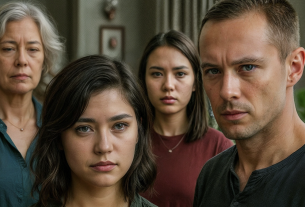It so happened that little Taya’s parents divorced and left their daughter in the care of her grandmother, Agnessa. Taya’s mother went off to Saint Petersburg to be with a new lover who wanted nothing to do with another man’s child. Grandmother Agnessa sighed heavily and scolded her wayward daughter, but she took Taya in and cared for her well.
They lived in a small township with only a few thousand residents. Everyone knew everyone, and if someone sneezed at one end of town, they’d already know who it was at the other. Word that Agnessa’s daughter had divorced, abandoned her child, and run off after her boyfriend spread quickly. But Grandmother Agnessa gave no grounds for gossip and answered every nosy question sharply.
“So, Agnessa, playing nanny now? Your daughter took off chasing new happiness without even asking whether you wanted to fuss over a granddaughter!”
“None of your business,” Agnessa would snap, turning on her heel if she was out, or showing the uninvited visitor the door if she was at home.
Taisia did well in school, but she had one problem—she was very beautiful. Her female classmates were consumed with envy, the boys trailed after her and wrote love notes. Taisia didn’t date anyone, but every boy somehow decided she preferred a rival, and real fights sometimes broke out in class.
“Taya, here’s what I’ll tell you, my girl. You are very beautiful, and for beautiful people—like beautiful flowers—life is not easy. Everyone wants to pick that flower and keep it for themselves. It will be the same with you. There are many good people, but there are also many bad and envious ones. People will try to sling mud at you to drag you down to their level. But know your worth and don’t waste yourself on trifles. Wait for the person who will love you not for your looks but for your soul and your mind,” Grandmother Agnessa would counsel.
“Oh, Grandma, it’s so hard. I don’t have any girlfriends—each one wants to be near me only because the best boys pay attention to me. But all the girls are so shallow and false,” Taisia lamented.
“Don’t worry, you’ll find a friend too—I can feel it’ll be soon,” Grandma comforted her as best she could.
And indeed, when primary school ended and they moved up to middle school, a new girl joined their class. She was a red-haired, freckled girl, lively and funny. She immediately became popular because she didn’t take anyone’s side—she was her own person. They seated her at a desk with Taisia.
“I’m Marta. What’s your name?” the redhead asked.
“Taisia,” the girl replied.
“Let’s be friends! My parents and I just moved to your town, and I don’t know anyone here,” Marta suggested.
“Let’s,” Taisia agreed—surprising herself—but inwardly expecting Marta to be as shallow as the others.
Unexpectedly, Marta turned out to be a good friend and an interesting conversationalist. She told Taisia the story of her short life in the big city, about her favorite books and films, that she practiced karate and would like to continue. The girls were inseparable. After school the friends would go either to Taya’s or to Marta’s. Their parents had nothing against their friendship. Marta couldn’t have cared less that Taya was beautiful—on the contrary, she was even proud of it.
“I look at you, Taya, and my heart rejoices—God really did create such beauty! Good for you!” Marta would praise her friend.
The girls finished school together. Marta enrolled at a university in Saint Petersburg and left to study, while Taisia stayed in the township because she dreamed of becoming a pastry chef. She got a job at a local café and made desserts both for the café and to order—for birthdays, weddings, and other occasions. Soon her desserts became very popular, and everyone came to order cakes only at her café.
At eighteen, Taya grew even more beautiful. Not a single man in town could pass her without a compliment. She took them calmly and didn’t give preference to anyone. But soon an unpleasant thing came to light—married men from the township started dropping by the café to flirt with her. Taya rejected their advances, but the suitors were persistent. Some even made bets about who would spend the first night with her.
“Tayechka, how about a walk along the river this evening? I’d love to spend some time with you,” said Nikolai, father of three.
“Stop it—aren’t you ashamed?” Taya rebuked him.
But the men wouldn’t let up. They began waiting for her after her shift and insisting on seeing her home. Some got angry when she turned them down (and she turned down everyone) and sneered:
“We know the likes of you—so high and mighty! As if!”
It was hard for Taya to hear such things about herself, but she clenched her teeth and went home. Soon other troubles began. The foolish husbands had the nerve to reproach their wives for not being as beautiful as Taya, which stirred up the wives’ hatred toward the unfortunate girl.
“Look, Galka, how pretty Agnessa’s Tasyanka has grown—like a piece of candy! A sight to behold! I could just eat her up.”
The wives found out where their husbands spent every evening and came to sort it out. Instead of confronting their husbands, they poured their anger on Taya.
They would come to the café and scold the girl as if she were to blame for her looks.
“Don’t you bat your eyes at my husband, you hear? Or I’ll tear out that pretty hair of yours!” one wife shouted, barging into the café.
Just then Agnessa appeared in the doorway.
“Keep a closer eye on your husband, Ira—Taya isn’t to blame for anything! And stay away from my granddaughter!” she retorted, shaking her fist at the raging wife.
Grandmother pinned great hopes on Taya marrying a good young man, but the trouble was that such young men were afraid to even approach her, thinking themselves unworthy.
When the wives’ harassment became unbearable, the girl decided to leave the township. She was already twenty; she found a job at a café in the big city—they were expecting her. How Taya hated to leave her hometown and her beloved grandmother!
She cried a lot before making her final decision. But Grandma supported her.
“Go, my granddaughter. In the big city things are different, and your beauty won’t stand out so much,” Agnessa consoled her, barely holding back tears herself.
“Grandma, I’ll call you, and I’ll come on weekends,” Taya promised.
“Don’t worry about me, dear—I’ll manage. I want so much for you to be happy; your hands and your heart are pure gold!” Grandma said, struggling to keep from crying.
Taya left and got a job at a French café. All the pastries there were made according to recipes from the head chef, Pierre, who was French. He strictly followed the rules of French cuisine and didn’t like anyone changing or adding anything. But, to everyone’s surprise, he accepted Taya’s adjustments without question. He was a devotee of feminine beauty and idolized the new employee, allowing her what he wouldn’t allow others—and holding her up as an example.
“Watch and learn from Mademoiselle Taisia; do as she does,” he told the staff. They had no choice but to obey—though it didn’t win Taya any love.
Pierre himself was divorced; his ex-wife and daughter remained in France. He fell in love with Taya with all his heart and began dedicating desserts to her, but he didn’t dare confess his love openly. Taya sensed everything but felt no such thing for him—she regarded him more like a father. Pierre saw this and sighed on the sidelines.
One day after work, Taya was walking down the avenue toward the room she rented from an elderly woman when she quite literally bumped into a guy from her township.
“Taya? Is that you?” he asked in surprise, spotting her in the café.
“Yes, it’s me,” she smiled. “And you’re… Kostya, right?”
“Yes, I’m Kostya. We studied in parallel classes, though you probably don’t remember—you were always surrounded by boys,” Kostya said. “I moved here recently and started university. I never met girls as beautiful as you, and somehow I was sure you were dating someone. So were my buddies.”
“You know, beauty constantly creates problems for me that ordinary girls don’t have,” Taya complained. “And I’m still alone because every suitor assumes I’m with someone else. But I’m just lonely.”
“I never thought of it that way, but now I get it,” Kostya said. “It was really nice to run into you here, Taya. You feel like family to me—being from our township—and I’ve been in love with you for a long time. If you don’t mind, I’d like to invite you for a walk this evening.”
“I don’t mind,” she said, laughing. With Kostya, she felt at ease; she didn’t feel obliged to be different—stern and unapproachable. She could be herself, and Kostya loved that.
They started seeing each other, and one day Kostya and Taya came home for the weekend. Some of Taya’s former neighbors—who had finally realized the girl wasn’t to blame for their husbands “falling for” her—came up to her and asked her forgiveness.
“Taya, forgive us,” one of the women said, lowering her eyes. “We were wrong.”
“It’s all right,” the girl replied, hugging her. “The important thing is that it’s all behind us now.”
The next day Taya and Kostya decided to stroll around town. They went to the local park, where they met another former neighbor, Marina, who had once been among those who condemned Taya.
“Taisia, may I speak with you?” Marina asked timidly, approaching the couple.
“Of course, Marina,” the girl said, letting go of Kostya’s hand.
“I wanted to apologize for how we girls behaved before. We were unfair to you,” Marina said, bowing her head.
“I understand, but it was very hurtful. And I never did any of you any harm!” Taisia said emotionally. “It’s not my fault that my looks attract your husbands.”
“You’re right. When you left, the passions cooled. And are you two together now?” one of the neighbors asked, looking from her to Kostya.
“Yes, we’re a couple now,” Taya said, blushing.
Taisia and Kostya returned to the city and continued building their relationship. Kostya successfully graduated from university and found a good job, and Taya kept working at the café.
One evening, as they sat on a bench in the park, Kostya took Taisia’s hand and said:
“Taya, I want you to know you’re the most important, the most beloved person to me. I want to spend my whole life with you. Will you marry me?”
Without hesitation, she answered:
“I will, Kostya.”
They were married in a small church in their hometown. Friends and family were there, including Grandmother Agnessa, who couldn’t hold back tears of joy. Marta came from far away, sincerely happy for her friend and weeping happy tears at the ceremony.
“Well, friend, congratulations!” Marta said, hugging her.
After the wedding, Taisia and Kostya returned to the city to begin a new life. They often visited Agnessa, who couldn’t get enough of looking at them and rejoiced quietly.
Over time, Taisia became a well-known pastry chef and opened her own café, where her pastries were hugely popular. She often delivered baked goods to orphanages, because she had a very kind heart. Kostya always supported her in everything she did, and at last she found her own happiness—and guarded it carefully.



